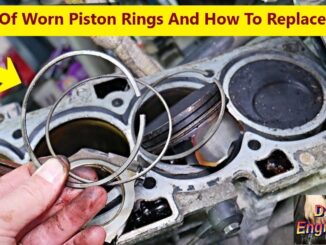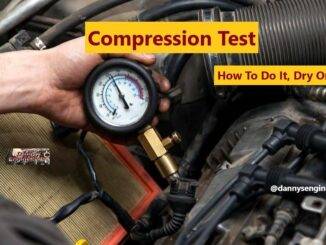
So, the most common reasons to do a engine rebuild are, loss of compression and or excessive engine oil consumption.
Consequently, what’s important now, is to recognize the signs of trouble, before you end up doing even more damage.
Engine Rebuild – Is It Worth It ? This may not be a easy question to answer. Fortunately, there are a few ways to narrow down where your problem(s) lies. Without doing a complete teardown of your engine.
Above all, having to to an engine rebuild, is very expensive and time consuming. So, making the correct decision, is very important. Consequently, the following signs generally indicate, internal engine trouble, likely meaning a rebuild is in your near future.
Loss Of Engine Compression
Low compression can stem from any type of internal engine problem. Like, burnt valves, worn out piston rings or blown head gaskets.
Engine Misfires
Engine misfires are a common sign of low engine compression in one cylinder. These occur when the engine skips one of the processes of the combustion cycle. In the case of low compression, the compression process is skipped or sometimes not executed well.
Loss Of Engine Power
Besides making the engine run rough and the vehicle jerk as it moves, misfiring also leads to power loss. Power loss in an engine is directly proportional, to the number of cylinders affected.
For instance, if 2 out of 4 cylinders are misfiring, there’ll be a 50% loss in power. Sure, you may be able to take the car for a drive with a 25% power loss. But, you likely won’t be able to drive in hilly/elevated terrains at the normal speed. A good sign you need an engine rebuild.
Poor Fuel Economy
The higher the compression ratio in a vehicle, the better its fuel economy will be, generally. It follows that when your car has low compression, fuel economy will be significantly affected. Your engine will burn up more fuel to cover a specific distance than it would in typical scenarios. If you notice reduced fuel economy, it’s a good idea to check for signs of low engine compression.
Engine Will Not Start
In the case all engine cylinders having low compression. Then, your vehicle won’t start, no matter how hard you try to power it up. The reason for this is that your engine won’t have enough pressure to ignite the air fuel mixture.
All of the signs above can be caused by lack of compression. But, they can also be caused by other things. So, before doing a engine rebuild, it should be confirmed, by performing a compression or leak down test.
Excessive Oil Consumption
Above all, oil consumption is the loss of engine oil, even though there are no significant external oil leaks. So, excessive oil consumption, is the consumption or loss of oil, at a rate that is faster than “normal.”
What’s normal depends on the specific engine. Because, each one will have its own, recommended change interval. And, may burn oil, at different rates compared to other engines.
Excessive oil consumption, can be caused by:
- Worn valve guides.
- Dried valve guide seals.
- Stuck oil control rings.
- Excessive cylinder to piston clearance.
The most common symptom of excessive oil clearances, is an awful knock coming from the engine. Low oil pressure, is also a symptom of, excessive oil clearances. But, is less common (by the time the oil pressure goes low there’s usually an engine knock evident).
Is It Worth It To Repair Or Rebuild My Engine ?
Most of the time, it comes down to a personal choice. There is no easy solution, to the question. But, there are cases, where it’s an easy decision. If the car is 20 years old, with 300,000 miles on it and is falling apart at the seams. Then, it’s pretty obvious, it makes no sense to fix it.
If the car is 5 years old and in good shape, it’s definitely worth fixing. Most of the cars that need engines, fall somewhere in the middle. Consider the total projected cost of the engine, plus any needed maintenance and repairs. Consider whether, you like your car or not, and the cost of buying a new or used car.
Keep in mind, that there is some uncertainty in buying a used car, even if you have it inspected. Remember to include financing costs and full coverage insurance, when thinking about a new car. In some cases, it is worth it to do an engine replacement, in excess of its blue book value.
So, If I Do A Engine Rebuild, My Car Will Be Like New. Right ?
Note: The car is much more, than just the engine. There’s steering, suspension, transmission, brakes, tires, axles, fuel injection, smog equipment, and a lot more. A car with a rebuilt engine, can still run poorly and fail a smog test. If you still have, bad ignition wires, a bad O2 sensor and still overheat, with a bad radiator.
How Do I Break In A Rebuilt Engine ?
Vary the engine speed and load. Don’t use over 75% throttle. Never go over 75% of the maximum (RPM). On a flat tappet engine, don’t use synthetic oil. Never let the engine idle for extended periods. Don’t cruise on the freeway at the same speed for extended periods.
It should only take about 500 miles to break an engine in. After that, change the oil and do what you want. Believe it or not, how you break your engine make a huge difference, in how long your rebuilt engine lasts. You should also be aware that, the engine rebuild will burn oil as it is breaking in. So, check the oil regularly.
In Summary: Engine Rebuild
So, why did the engine fail in the first place ? This is important to consider. If your maintenance was spotty and you don’t change your habits. Then, the new engine, will fail as well. Finally, there is usually a specific reason, for engine failure. Our About Page also has more information.
Thank You!




